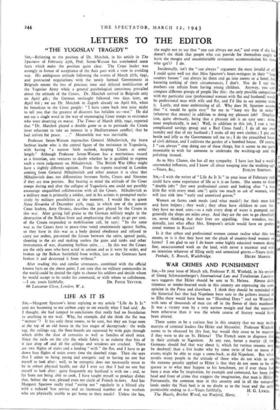LIFE AS IT IS SIR, —Margaret Sparrow's letter replying to my
article "Life As It Is" sent me hastening to my carbon copy to see exactly what I had said. As I thought, she had jumped to conclusions that really had no foundation in anything in my wail. Why, for example, did she think the flat was "minute "? It has only three rooms, to be sure, but they are huge ones at the top of an old house in the last stages of decrepitude: the walls sag, the ceilings sag, the floor-boards are separated by wide gaps through which drifts the dust of centuries as well as families of small mice. Since the raids on the city the whole fabric is so ricketty that bits of it just drop off and all the ceilings and windows are cracked. There are two flights of stairs and a landing " with " the flat, and I have to go down four flights of stairs every time the doorbell rings. Then she says that I admit to being young and energetic and to having no one but myself to look after: well, to be energetic does not necessarily mean to be in robust physical health, nor did I ever say that I had no one but myself to look after: quite frequently my husband is with me ; and, so far from not being able to cook, I have taught myself to produce dishes that, before the war, pleased even my circle of French in-laws. And has Margaret Sparrow really tried "eating out" regularly in a blitzed city with a reduced 'bus service and an increased number of war workers who are physically unable to get home to their meals? Unless she has, she ought not to say that "one can always eat out," and even if she ha doesn't she think that people who can provide for themselves ought leave the meagre and uncomfortable restaurant accommodation for those who can't? I do.
Incidentally, isn't the "can always" argument the most invalid of all? I could quite well say that Miss Sparrow's heart-wringers in their "large country houses" can always let them and go into rooms or a hotel, but, knowing nothing of their circumstances, I don't. Nor do I say that mothers can refrain from having young children. Anyway, you can' compare different groups of people like this: the only possible comparison with my particular case (professional woman with flat and husband) would be professional man with wife and flat, and I'd like to see anyone make it. Lastly, and most embittering of all. Why does M. Sparrow assume that "it would be quite easy" for me to "keep my flat in order" (whatever that means) in addition to doing my pleasant job? (Implica- tion, quite obviously, being that a pleasant job is an easy one: mine, most emphatically, is not.) Well, in addition to this job, I run a very complicated savings group and a Red Cross fund ; I do all my owa
laundry and that of my husband ; I make all my own clothes ; I pot and bottle and jelly as the Government tell me to ; I do the prescribed hours
of civil defence, and I cultivate the garden of a bombed house. Of course, I "can always" stop doing any of these things, but it seems to me quite reasonable to wish for someone to undertake the washing-up and the polishing instead.
As to Mrs. Clunes, she has all my sympathy. I have just had a week's unattended influenza, and I know all about weeping into the washing-up!
th


























 Previous page
Previous page